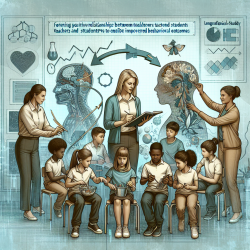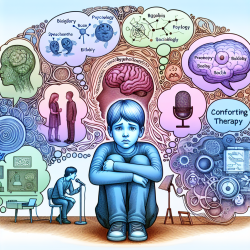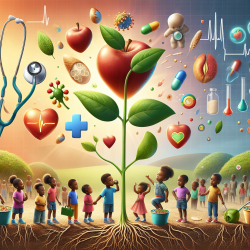Introduction
In the realm of educational psychology, the significance of teacher-student relationships is well-documented, particularly in relation to students' behavioral and emotional development. A recent study titled A Non-bipartite Propensity Score Analysis of the Effects of Teacher–Student Relationships on Adolescent Problem and Prosocial Behavior provides empirical evidence on how these relationships can influence adolescent behavior. This blog explores the study's findings and offers insights for practitioners seeking to enhance their skills in fostering positive outcomes for students.
Understanding the Study
The study utilized data from the Zurich Project on the Social Development of Children and Youths (z-proso), involving a culturally diverse sample of 7- to 15-year-olds. Researchers applied a non-bipartite propensity score analysis to assess the impact of teacher-student relationship quality on problem and prosocial behaviors. The analysis involved matching students based on their propensity to experience certain levels of relationship quality and comparing behavioral outcomes.
Key Findings
The study revealed that students with better teacher-student relationships exhibited fewer problem behaviors and more prosocial behaviors, both concurrently and up to four years later. This suggests that positive relationships with teachers can have a lasting impact on students' behavioral trajectories.
- Problem Behaviors: Students with stronger relationships reported fewer aggressive and oppositional behaviors.
- Prosocial Behaviors: These students also demonstrated increased prosocial behaviors, indicating a greater likelihood of engaging in positive social interactions.
Implications for Practitioners
For educators and speech-language pathologists, these findings underscore the importance of nurturing positive relationships with students. Here are some practical steps practitioners can take:
- Emphasize Emotional Support: Create a classroom environment that fosters emotional support and connectedness. This can be achieved through regular check-ins and open communication.
- Encourage Fair Treatment: Ensure that students feel treated fairly and supported by their teachers. This can help build trust and improve student engagement.
- Focus on Long-Term Development: Recognize that the benefits of positive teacher-student relationships extend beyond immediate behavioral outcomes, influencing long-term development.
Encouraging Further Research
While this study provides valuable insights, it also highlights the need for further research. Practitioners are encouraged to explore additional factors that may influence the effectiveness of teacher-student relationships, such as cultural differences and individual student needs.
Conclusion
The study's findings reinforce the critical role of teacher-student relationships in shaping adolescent behavior. By focusing on building strong, supportive relationships, educators can foster positive outcomes that extend well into adolescence. For those interested in delving deeper into the research, the original study can be accessed here: A Non-bipartite Propensity Score Analysis of the Effects of Teacher–Student Relationships on Adolescent Problem and Prosocial Behavior.










